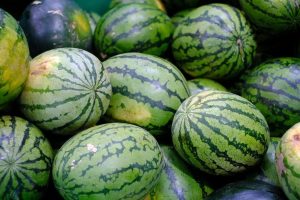When cutting a watermelon, toss it out immediately if it looks off. Melons are a beloved summer treat, especially for their hydrating qualities. To pick the perfect watermelon, pay attention to its weight, appearance, and tail color. A ripe one feels heavy and has a shiny shell with a yellow spot on its underside. Tap it lightly; if it sounds hollow, it’s good to go. Opt for oval or round shapes over asymmetrical ones. Lastly, only consume cracked melons from the center.

Every household strives to maintain a diet abundant in fruits and vegetables. Thus, it’s crucial to discern organically grown produce from those cultivated with artificial fertilizers.
Many growers resort to using accelerators to speed up the growth of melons, with the split in the melons’ center being a telltale sign of artificial cultivation. This cracking occurs due to the application of chemical fertilizers to stimulate growth.
Watermelon boasts numerous health benefits. Its seeds are packed with nutrients, containing 30.6 grams of protein in just 150 grams of dry seeds, supplying 61% of the daily protein requirement. These seeds also provide essential amino acids like tryptophan, glutamic acid, lysine, and arginine, which aids in controlling blood pressure and alleviating arterial pain.
Watermelon seeds are also rich in niacin, thiamine, riboflavin, vitamin B6, and pantothenic acid, crucial for digestive, nervous system, and skin health. Additionally, they contain minerals such as magnesium, phosphorus, iron, potassium, sodium, copper, manganese, and zinc, beneficial for muscle and joint support.
The watermelon’s core is low in fat and cholesterol, containing citrulline primarily found in the peel. Citrulline aids in detoxifying the liver, widening blood vessels, reducing oxidative stress, and boosting energy levels. Moreover, the core is abundant in vitamins A, C, D, E, B6, and B12, as well as minerals like calcium, magnesium, potassium, phosphorus, zinc, and selenium, reinforcing the immune system and combating various diseases.
Watermelon exhibits a higher concentration of lycopene compared to tomatoes, a potent antioxidant known to reduce bad cholesterol and protect against osteoporosis, cataracts, and cardiovascular diseases.



